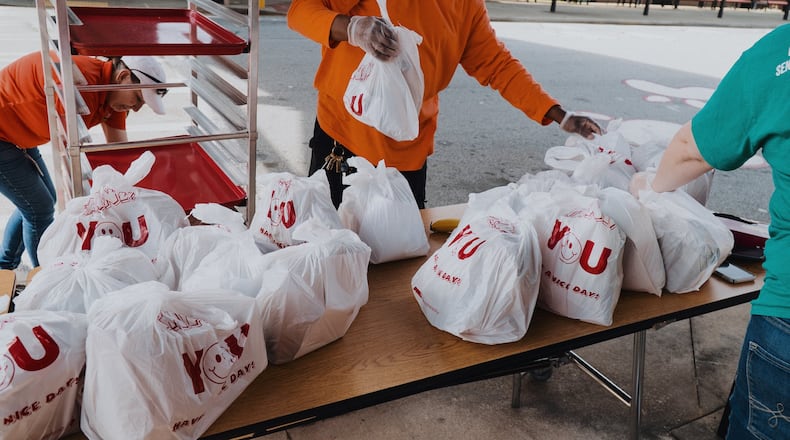Community organizations are working overtime to help households unable to meet their own food needs amid COVID-19 regulations that have prompted layoffs, pay cuts and shelter-in-place orders.
Relationships with metro Atlanta school districts have proven beneficial as health standards force some agencies to forgo using volunteers and the number of those seeking services has increased dramatically.
“It’s unlike any challenge we’ve ever faced,” Kyle Waide, Atlanta Community Food Bank’s chief executive officer, said recently about serving families amid the coronavirus outbreak. “It has been an extraordinary challenge. It’s more expensive for us … changes the way we distribute food.
“It makes everything harder to do.”
The food bank is distributing more than its average 1.5 million pounds of food a week, but doing it under stressed conditions and spending more on supplies they could previously count on from area grocery stores.
Waide said new requests coming into the organization for services have increased about 300% since early March, and safety protocols have changed the food distribution process. While the food bank uses about 30,000 volunteers each year, none are currently being used. Food distribution also is happening through partnerships with the YMCA, United Way and Hands on Atlanta, among other organizations.
The schools have been critical to reaching more families faster under unprecedented restrictions, Waide said.
“Having those relationships have helped us stand up those distributions quicker than we would have,” Waide said. “It’s a reflection of how embedded the food bank is in the community.”
Many school districts across Georgia closed to help slow the coronavirus' spread. More than 100 schools across metro Atlanta are being used to distribute food to students, including some open specifically to distribute meals for entire families, which cuts down on how many volunteers would be needed as schools become the new distribution hubs.
“The Atlanta Community Food Bank helped to bridge the nutritional gap between meals provided by (DeKalb County School District) School Nutrition in a collaborative effort to combat food insecurity in our county,” said Connie Walker, DeKalb’s executive director of school nutrition services.
The DeKalb County School District is currently using about three dozen schools and county recreation centers to distribute food, in addition to meals delivered to some neighborhoods by bus. Not only does the partnership provide food, said Vasanne Tinsley, the district's deputy superintendent of student support and intervention, but it helps to provide healthy options.
“Parents throughout the district have expressed appreciation for the food distribution provided by the Atlanta Community Food Bank,” Tinsley said. “Several parents have shared that they were having financial difficulties, and this wraparound support allowed them not to have to worry about food for that day.”
Cobb County Schools already works with MUST Ministries, which already feeds families in Cobb County, to distribute food to students and families, on long breaks and in the summer months. Ike Reighard, MUST Ministries’ president and chief executive officer, said the nonprofit has had to become more creative with social distancing to collect and deliver food.
“Together, we’ll get through this period of time because our community is generous and resilient,” Reighard said. “In the meantime, we’re continuing to join with the schools and also distribute in our pantries to feed people while operating our shelter and housing programs. Thousands of people depend upon us and we take that mission seriously. Our delivery model has changed, but our commitment hasn’t.”
Cobb Schools Superintendent Chris Ragsdale praised the partnership with MUST Ministries, calling it “a great example of the appropriate balance between student health and well-being, staff safety, and compliance with state and federal guidance.”
Clayton County Public Schools has several schools doubling as meal pickup centers while classes are online. They partner with the Atlanta Community Food Bank as well.
“This partnership has proven to be extremely valuable during the school closures resulting from COVID-19,” said Angela Horrison-Collier, the district’s director of student service. “Through our collaborative efforts, we have been able to provide additional food resources to the students and families in Clayton County.”
Atlanta Public Schools, which also partners with the Atlanta Community Food Bank, also has several meal pick-up locations across the district and is delivering to some neighborhoods by bus.
“As Atlanta Public Schools worked to keep children all over the city fed in a global pandemic, the (Atlanta Community) Food Bank stepped up and supercharged our efforts to keep Atlantans from going hungry,” APS Superintendent Meria Carstarphen said.
In the meantime, Waide said people can donate to help offset some of the unexpected costs associated with helping more people amid a food supply shortage. Also, volunteering with other groups, such as the YMCA, United Way and Hands On Atlanta can help.
Waide said one of the most important things people can do to help the organization is following guidance from health and government officials to slow the spread of the coronavirus.
“The sooner we can get that public health crisis behind us,” he said, “the sooner we can get operations back to normal.”
About the Author
Keep Reading
The Latest
Featured


